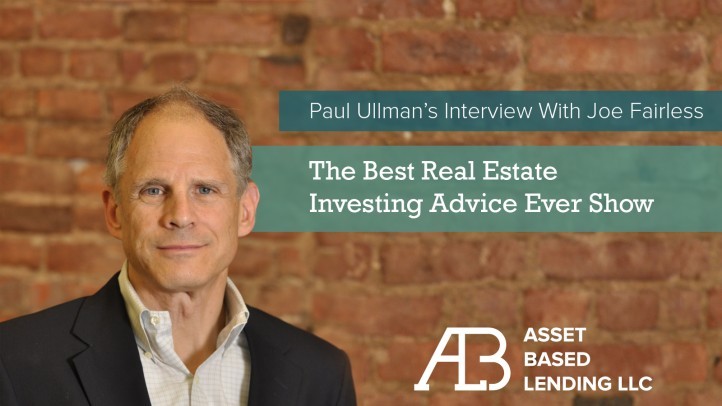The best real estate investing advice ever.
ABL’s Managing Partner, Paul Ullman, recently sat down with Joe Fairless of “The Best Real Estate Investing Advice Ever Show” podcast to discuss what makes a successful real estate investor, why all hard money lenders are not created equal, and some of his favorite real estate investing advice.
An audio recording of the interview is below, along with the full transcription.
Joe: How are you doing, Paul Ullman?
Paul: I’m doing very well, thank you Joe.
Joe: Well nice to have you on the show. A little bit about Paul. He is the founder and CIO of Asset Based Lending. He is a private lender and he lends to residential real estate investors for single family and multi-family properties. Since 2010 Asset Based Lending has closed over 700 transactions totaling over 170 million dollars and prior to that he was the president and CIO of Highland Financial. He is based in Hoboken, New Jersey and you can say hi to him and his team at ablfunding.com. You can just click the link in the show notes page if you want to do that instead. With that being said, Paul you want to give the Best Ever listeners a little more about your background and what you’re focused on now.
Paul: Sure, I have a long background in financial services. I used to trade mortgaged backed securities believe it or not, for many years for a formerly famous Wall Street firm called Solomon Brothers. And then I started my own trading firm in the late 90s where my current partner at Asset Based Lending, Dan Leyden, joined me as our Chief Financial Officer. And that company had a great run for 11 years, and then in 2010 Dan and I decided there was a remarkable opportunity in residential real estate and decided to start a lending company to help people who wanted to invest in singles and multi-family residential real estate in the New York and New Jersey area to accomplish their goals. And it turned out to be remarkably good timing. Since we started in 2010, we’ve done, now, 750 separate transactions for about 160 million dollars. So, we’ve done a nice job for ourselves, we’ve done a nice job for our borrowers. The principals that we abide by as a lender are really, in my understanding of the industry, the same principles that our peers manage their businesses with throughout the country which is providing a good service: being responsible to our borrowers, being responsible to our investors and their investors, and doing what we say that we’re going to do.
Joe: What has been the biggest challenge from 2010 to now?
Paul: Well, I’d say the initial challenge was learning the business. Neither Dan nor I had any experience in lending money. We were securities guys for decades. And we knew a lot about that business, but we didn’t know anything at all about how to actually meet borrowers, how to structure a loan that would meet their needs and be safe for us and our money and our investors’ money. And so we had to teach ourselves that, and that took a while. We’re still learning honestly. Every day we learn something knew about the business. Basic blocking and tackling: how do we make a verifiable loan with good title, good deed, good lien, and then, every bit as importantly, obviously, finding borrowers who had the capacity and the willingness to manage their project in the way that they described it. So not only do we have to learn how about how to do the technical aspects of the loan, we had to learn about how to talk to the borrower about how the project was gonna go. And how to listen carefully to what they said and whether it made any sense or not. We had to figure out how to document their project objectives in a way that makes sense. And then after we had to learn all that stuff, we had to additionally learn how to go out and find the borrowers. When we first started in the third quarter of 2010, we didn’t know anyone. We advertised ourselves on Craigslist.
Joe: I was gonna say Myspace back then.
Paul: Yeah ancient history. So that’s how we got out first borrower; on Craigslist. We’ve come a long way since then. We now have a very active website. We have a team of 12 professionals that helps us manage the firm. We have a third partner now, Kevin Rodman, joining Dan and myself. And we probably get 20 leads a day now from borrowers in nine states. We are predominantly in New Jersey, New York, Eastern Pennsylvania, mostly the Philly region, but we also lend in Southern Connecticut, the Boston area of Massachusetts, Baltimore, DC, a bit in Delaware, and Southern Florida.
Joe: What would you say is the main way you’re getting those leads?
Paul: Its return borrowers, its referrals from other borrowers. Its web leads and brokers.
Joe: So return borrowers and their referrals, web leads, and brokers.
Paul: Correct.
Joe: And what would you say is the way that you differentiate your company because it sounds like when you first started it was a company that the space wasn’t as crowded, but now the space is much more crowded then when you started, so how are you differentiating your company?
Paul: Well just a word on “crowded.” What was the case when we started and what still is the case is the vast majority of lending to real estate transactions is done through what we call and I think what the industry calls private lending, as distinguished from hard money lending? And the important distinguish between the two has to do with the, what I’ll call, institutional quality of the lender. Hard money lenders are pros. They are in the business to make loans and get repaid. Private lending as the industry describes that term or thinks about that term relates to someone’s friends or someone’s accountant or lawyer, or next door neighbor. Someone who is around in a particular area that can make a loan or two or maybe five, but then they’re out of money. So the vast majority of lending is through what is now known as peer-to-peer, but was not previously known that way; it’s just people around that you heard of. So all of the new entrants into the market place are taking some market share from private lenders. They’re exchanging market share among the hard money lenders. But also the industry has grown. As the various real estate markets around the country have stabilized, first over the course of 2011 and 2012 and really started taking off in the years subsequently, there have been a lot more people that have entered the fray. Which is typical for prices for marketplaces that are showing buoyancy. So we’re reaping the rewards of both of those two features where our brand name has become more commonplace in our marketplace. So more people will think of us than the guy next door. And more people are entering the market. So all that is background. To answer your question how do we differentiate ourselves; its service, really. The product that we offer people is money. And that’s a commodity. And you can get money from a bank at a vastly lower interest rate than we’re going to lend at. The service that we provide and we get paid a lot of money for, and other lenders like us, is the ability to deliver the goods when its needed. The formal service that we’re providing to borrowers is speed. Which is something that neither Dan nor I realized when we first started the company. We thought that we were going to lend to people that weren’t really bank ready. Turns out that most of our borrowers are very bank ready, but banks for a variety of reasons can’t or won’t respond to the need that most people required, which is typically less than two weeks. We can do a bank grade loan with a two week close, or less, if the situation really requires it.
Joe: When you look at the space for where it is today and, in particular, as it relates to your business offering and where it will be in 12 months, are you going to continue with, I see on your website its primarily 1 to 4 units, primarily, I see you got loan programs for a couple things, but are you gonna continue in that arena or are you gonna evolve towards the larger stuff.
Paul: Well our loans now range in size from $75,000 to two and a half million. That maximum loan size has increased as the pool of capital that we have available to us has increased.
Joe: And where does that capital come from?
Paul: We have a fund. We started with our own money. And then we brought in friends of ours and family members as participations in those loans. And then in June of 2012 we started a fund called ABL1, and that fund now has 50 million dollars’ worth of capital in it.
Joe: Fifteen or Fifty?
Paul: Five zero. And then it has another fifteen million credit line on top of that. So we got 65 million dollars’ worth of capital at our disposal.
Joe: And how much is deployed right now?
Paul: All of it.
Joe: Including the credit line?
Paul: I’d say about half the line right now, but we’ve taken down the whole line. The way that we fund our loans, and it’s important to say that we are a direct lender and having the fund and the credit line allows the flexibility to close and know that were gonna close whenever our borrowers need us to close, but we also, what I’ll call, recirculate our capital, meaning that we sell loans in packages to other financial institutions at a lower yield then what we originate them at. We get paid off frequently, I mean, we make a 12-month loan and our average pay off period is ten months. And then we also get new capital.
Joe: And do you get new capital from private individuals, or, how does that work?
Paul: Yes, acredited investors.
Joe: Okay, who invest in the fund?
Paul: Correct. They are membership interest. Which is a pool to be, I mean, they own a share in each of the loans that the fund holds.
Joe: For someone who wants to start out and replicate the approach of using your own money and then creating a fund to then use to deploy capital for investments, what would you tell them?
Paul: Be prepared to work 16 hour days.
Joe: For how long?
Paul: For however long you’re gonna be a lender. Lending is hard. It’s totally comprehensive and borrowers contact you at any hour of the day or night. And again, the service we’re providing is access. Access to us to hear their story and access to money to fund their deal. So, they don’t want to wait around. If they call us to and we don’t answer they’re on to the next person. As well they should be, that’s what I would be.
Joe: So being prepared to work 16 hour days, what else would you tell them?
Paul: You need a pool of capital that has significance because if you have a good service you can’t ever run out of money. That’s the big no-no. You have to always have the capital necessary to fund the loan that you say you’re going to fund. And that’s the great fear and legitimate fear that borrowers have. That whatever lender that they put their trust in will, for whatever reason, not show up when they’re supposed to show up. And that’s not only to settle the purchase, that’s also to manage the draws. Because most of our loans, almost all of our loans, have rehabilitation projects that will go on after the close so there’s additional capital that’s required to fund those draws and to fund them efficiently and quickly and professionally. Any new lender or any lender, any good lender, also has to have a stock and knowledge and experience about where the good properties might be, the good brokers, the good contractors, the good attorneys, the good title agents, the good realtors. We consider our borrowers, and any professional hard money lenders considers their borrowers, to be their partners and we are here to help them every step of the way.
Joe: When you look back to when you first started, and knowing what you know now, the 16 hour days, the pool of capital, the knowledge and experience, what’s the one area that you had to work the hardest on? Whether it was allocating your time differently so you could do the 16 hours, or getting that capital, or educating yourself.
Paul: I don’t know whether I can distinguish. It was all so new. So we worked hard at everything. In lending, in addition to all the other stuff that I previously talked about. Is a very technical business. You have to know what a lien is and what it is not. And know how to perfect that lien. You need to understand what a high quality loan package looks like. You need to find good lawyers who will help you close those loans and good title agents that will help you make sure that there’s no prior lien on the property. I mean there’s so many details. It’s one of the reasons why, I mean, I don’t really fear the competitors because it’s all about execution. People have been lending money since the Babylonians, literally. So there’s nothing new here. Even the concept of secured lending is literally as old as the hills. It’s all about just doing it and doing it well day in and day out.
Joe: Well I think that might Segway nicely into this next question. Paul, what’s your best real estate investing advice ever?
Paul: Get married to someone who wants to start a family and buy a house at just the right time.
Joe: You should see the look on my face. I’m so confused. Will you elaborate?
Paul: The best real estate investment that almost everyone will make, if he or she makes a good real estate investment, which may not happen, is their primary residence. Which they will hold hopefully for a long period of time. And will appreciate tax deferred for a long period of time.
Joe: Even if you do sell there’s not gains unless its above, what, $500,000?
Paul: Yeah! Buying a house and holding a house, particularly if the timing is right, and that’s just so variable. No one can time these things perfectly, but it is typically the case that a primary house is anyone’s best real estate investment.
Joe: I know Robert Kiyosaki wouldn’t call it an investment, but we won’t get into that one. Are you ready for the best ever lighting round?
Paul: Sure.
Joe: Best ever book you’ve read?
Paul: “The Power Broker” by Robert Caro
Joe: Best ever personal growth experience and what did you learn from it?
Paul: Climbing up Highland Paths in Aspen. That I could exist at 13,000 feet.
Joe: Best ever way you like to give back?
Paul: My kids.
Joe: What is the best ever deal you’ve made?
Paul: Buying my primary house.
Joe: And what would you say is the biggest mistake you’ve made in real estate thus far?
Paul: Selling my primary house.
Joe: And where can the Best Ever listeners get in touch with you?
Paul: Our website, www.ablfunding.com. You can email us at [email protected]. We would love to hear from any listener who has a deal that would like to get funded.
Joe: Awesome. Well, Paul, thank you so much for being on the show and sharing your advice with the Best Ever listeners and talking about how you got going. And then also getting into the specifics of started out with your own money then you created a fund you called ABL1. At 50 million dollars’ worth of capital now plus a 15-million-dollar line of credit. And your advice for people who want to go that route. The three-fold advice. 1.) Be prepared to work 16 hours. 2.) You need the money, you need capital and that has a very significant role in this process obviously. And making sure that you are clear on how that is deployed and judicious. 3.) Having a knowledge and learning on an ongoing basis and knowing the people that you need to know to get you to the next level like the brokers, the property managers, the attorneys, the title agents. And then I loved the quote where you said, “You don’t fear the competitors, it’s all about execution.” I think that can be applied to not only your industry, but any industry. I’ve heard money entrepreneurs who are billionaires say, “so many people come up to me and tell me they have a great idea, but it’s not about the idea it’s about the execution” and when you said that, that came to mind again. So thank you so much for being on the show, hope you have a best ever day and we’ll talk to you soon.
Paul: Thank you Joe, really appreciate the opportunity.







0 Comments